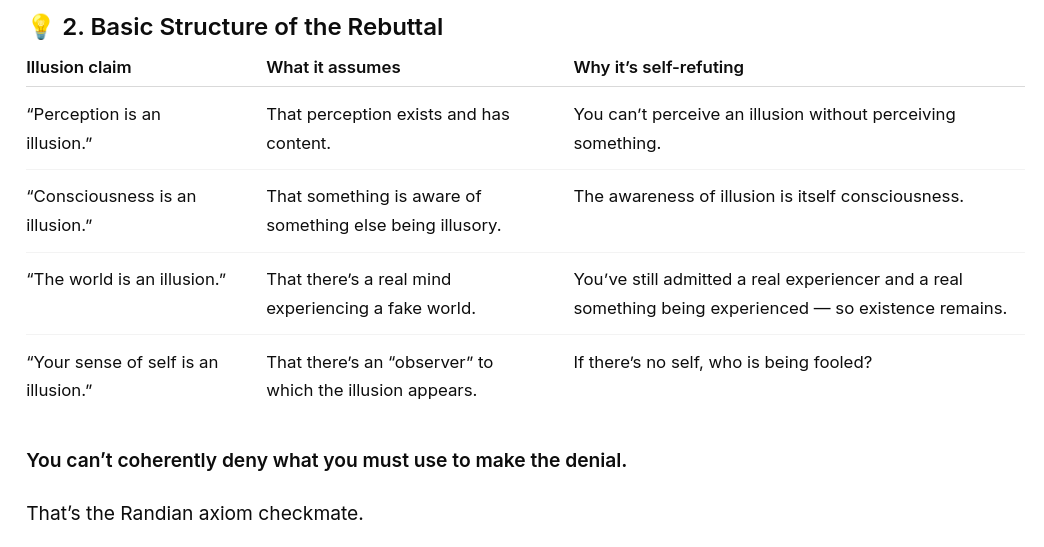The Illusion Psyop
🧠 1. The Core Problem: The Self-Refutation Trap
When someone claims “Everything is an illusion,” or “Perception is an illusion,” or “Consciousness is an illusion,”
they are using perception, consciousness, and the experience of existence to deny them.
That’s a performative contradiction — a self-refuting claim.
To say “it’s all an illusion,” one must:
exist,
be conscious,
perceive (even conceptually),
and distinguish between “illusion” and “reality.”
But if all is illusion, there’s no real distinction between illusion and reality — which means the statement “it’s an illusion” is meaningless.
“To call something an illusion presupposes the reality of that which is not an illusion.” — Leonard Peikoff, Objectivism: The Philosophy of Ayn Rand
So the claim destroys itself.

⚔️ 3. Rand-Style Rebuttals (sharp, memorable, assertive)
-
“Illusion to whom?”
You can’t have an illusion without someone being aware of it. Awareness can’t be an illusion of awareness — that’s like saying a mirage exists but nothing’s seeing it.
-
“An illusion of what?”
To call it an illusion, you’ve already distinguished it from what’s real. The concept depends on reality — so you’ve just affirmed what you tried to deny.
-
“You can’t use consciousness to prove consciousness doesn’t exist.”
That’s like talking to prove speech is impossible.
-
“You can’t perceive that perception is invalid.”
The claim eats itself. The more seriously you assert it, the less sense it makes.
-
“If everything is illusion, then so is your claim — so why believe it?”
Universal illusion = universal nonsense. There’s no epistemic traction left.
🔍 4. The Proper Framing: Illusions of What Exists
Illusions are misinterpretations of reality, not escapes from it.
An illusion presupposes a perceiver, a perceptual mechanism, and a real input.
A mirage of water is still real light hitting real eyes interpreted by a real brain.
A dream is a real mental event in a real organism.
So illusion belongs within reality. It never replaces it.
Rand (and Aristotle before her) would call this the primacy of existence:
consciousness is awareness of reality — not the creator of it.
⚙️ 5. Modern reformulation (for clarity or secular audiences)
Even outside Randian terms, you can frame it in logic or cognitive science:
Perception is limited, not illusory.
Error ≠ nonexistence. Limitations don’t erase the thing being limited.Epistemic honesty ≠ metaphysical nihilism.
“We might be wrong about some things” doesn’t mean “nothing is real.”Information-theoretic version:
“Distortion presupposes signal.” There is no ‘illusion’ without a real input to distort.
🪞 6. Objectivist Summary Formula
“Illusion” implies awareness of a difference between appearance and reality.
But to grasp that difference, reality must first be real.
The concept of illusion rests on the fact of existence and the fact you're conscious of a difference between the mirage and the waterhole.
🗣️ 7. Quick, Practical Retorts You Can Use
“The illusion of consciousness presupposes the consciousness of illusion.”
“If your perception of the world is an illusion, what’s doing the perceiving?”
"If your senses are illusory, which sense did you use to determine this?"
“Even hallucinations require a real brain to hallucinate.”
“Error doesn’t prove unreality — it proves you’re real enough to make one.”
“If everything’s an illusion, you can’t even know that — your statement refutes itself.”
